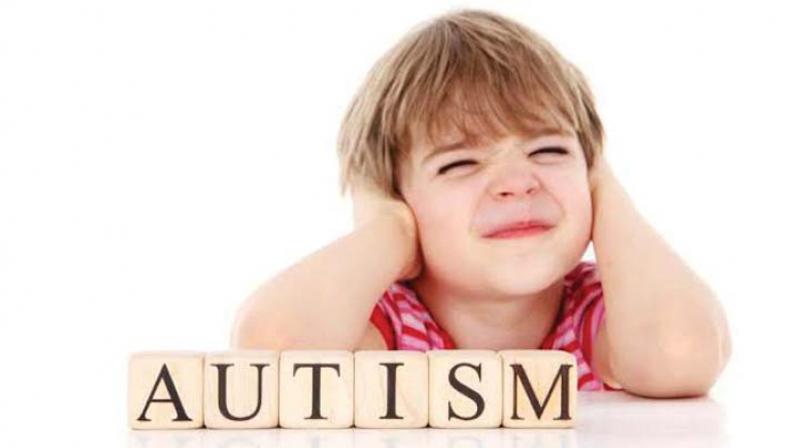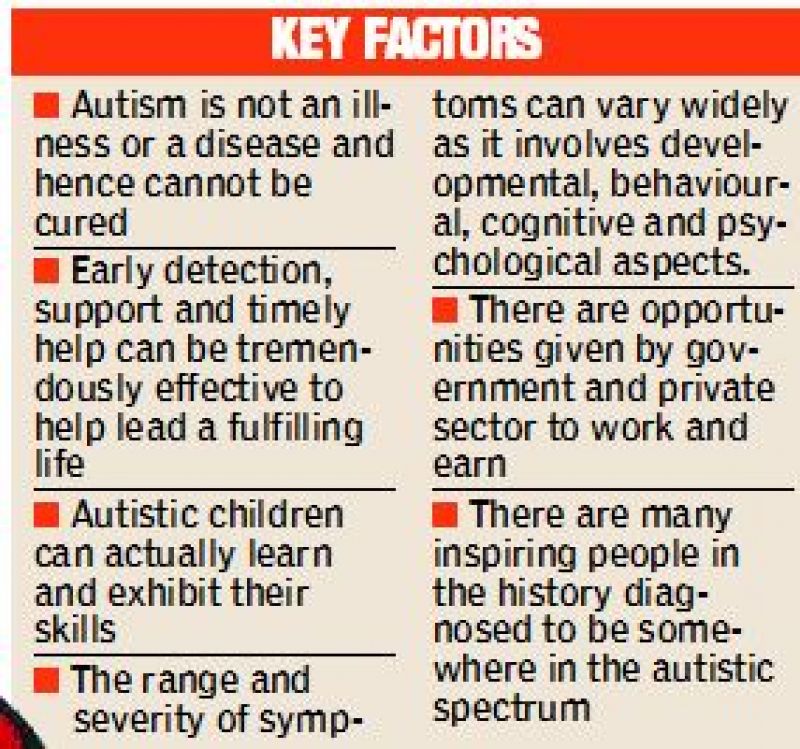Autistic people see, hear and feel words differently
Certain homeopathic medicines are reported to provide better control over excretory functions.

Living a life diagnosed with Autism involves challenges in every step. The most valuable aspect that needs to be accepted is that they possess a unique set of skills and perspectives; hence they are just differently abled. Who they are as a person is not impacted by a medical condition and it surely doesn't contribute to their identity. What is important is to learn that each person in this world is 'able' and each one matters!
The puzzle ribbon was adopted in 1999 as the universal sign of autism awareness which denotes the diversity and complexity of the people with such condition. A 'light it up blue' campaign is also conducted where many landmarks around the globe will be lighted blue as a gesture of respect.
Autism, or autism spectrum disorder (ASD), is explained as a neuro-developmental disorder that refers to a broad range of conditions characterized by challenges with social skills, repetitive behaviours, speech and nonverbal communication.

Autistic people see, hear and feel the world differently from other people. If one is autistic, he is autistic for life. Autism is a spectrum condition. Being autistic will affect them in different ways. Some autistic people also have learning disabilities, mental health issues or other conditions, which means people need different levels of support.
Lesser known facts
Autism is much more common than most people think. People from all nationalities, cultural, religious and social backgrounds can be autistic, although it appears to affect more men than women.
According to the Centers for Disease Control, autism affects an estimated 1 per cent of the world population with 1 in 59 children affected in the United States today. Experts say there are around 700,000 autistic people in the UK alone and 1 in 68 children in India are diagnosed with autism with an overall of more than 1 million cases reported per year.
Effective Therapies
Apart from the use of allopathic medication, the necessity of providing 'sensory diet' that can provide the child with the sensory input he or she needs to be in a “just right” state, as part of sensory integration therapy requires to be emphasized here. This can include simple activities like blowing bubbles, swinging, kneading dough or eating crunchy vegetables to the use of special tools like squish sand or slime, therapy balls, specially designed pathways to walk, lighted bricks and balls and vibrating pen to facilitate their hand and eye coordination, motor skills and overall functions . Behavioural therapy, hydrotherapy, occupational therapy, speech therapy, animal-assisted therapy and music therapy are beneficial too to canalize their energy thus soothing their minds to relieve the aggressiveness. Stem cell treatment is being talked about as an effective option in future.
Certain homeopathic medicines are reported to provide better control over excretory functions. The massage by an osteopath proves beneficial in relaxing their muscles, rendering flexibility and enhances locomotor abilities, as per the experience shared by parents.
Not the end of the world
Parents being primary caretakers are expected to help them thrive, understanding the fact that their child may not be like others but is definitely special. There are many special schools in the country to impart effective training and basic education. Several facilities provided by the government can be utilised like the cell for assisting the differently-abled in institutions for higher education and also the reservation for differently-abled for jobs. That includes those with learning difficulties as well. Some companies hire people with autism as part of a policy to empower them and bring them to the mainstream society.
Bring about the change
The first step should be to learn properly about the condition. To stress upon their abilities, not disabilities should be the motto. One can get involved in campaigns and activities for awareness as well as acceptance of autism in society. Undergoing training to become well-equipped in aiding a colleague in school or workplace should be a major point of preference. We can also engage in real-life interactions with autistic people, spend time with them to understand difficulties and offer practical solutions by forming a care team. Another efficient method is to partner with several organisations who work seriously in this area to chart out and plan beneficial programs that also includes promoting autism - friendly business to support the people with autism in the long run.
Emotionally strong mothers never complain but longingly look forward to seeing their children at least having their meals independently some day. We must imbibe lessons for survival from their extraordinary willpower.
Some inspiring people on the spectrum
Trinity College professor Michael Fitzgerald, a leading psychiatrist, researched and published a paper concluding that Charles Darwin had Asperger’s Syndrome.
Dr. Muhammad Arshad published in the Royal Society of Medicine’s Journal of Medical Biography a convincing paper arguing that Michelangelo was almost certainly autistic. Another leading researcher on the topic, Prof Michael Fitzgerald, agrees.
Judith Gould, the director of the leading diagnostic center for autism in the United Kingdom, insists that it makes perfect sense that famous artist Andy Warhol was autistic. Likewise, many research papers have been presented to argue that genii like Sir Isaac Newton, Mozart, Yeats, Einstein or Bobby Fischer may have been also possibly been somewhere on the spectrum, after carefully evaluating their rare characteristics.
(Dr Anjana Kannankara is chairperson of Institution for differently abled)

